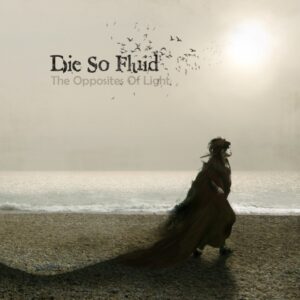‘The opposites of light’ is the fourth album from Die So Fluid, the English hard rock band formed in 2000 in London. Fronted by the supremely talented Georgina ‘Grog’ Lisee, the band’s vocalist and bassist, the band immediately stood out from the vapid nu-metal scene then dominating the charts with their intelligent lyrics, layered harmonies and fascination with bands such as Tool, Deftones, Drain and Alice in Chains. The band’s fierce independence means that in the intervening years they have hardly been what can be described as prolific, but what they may lack in quality, they have most certainly made up for in quality, and ‘the opposites of light’ is a fine album, packed with intriguing melodies and left-field rock sensibilities.
Opening with ‘Nightmares’, the first side (named ‘Shakura’) kicks off with bottom heavy grinding riffs and Grog’s sultry voice slithering out of the darkness. It immediately captures the attention and the riff-laden chorus will make every effort to worm its way deep into the recesses of the brain. Offering a slower pace than previously, comparisons with Drain STH (who similarly employed layered harmonies and huge, Cantrell-worshipping riffs) can be made, but Die So Fluid have a deftness of touch and a wider sonic palette than Drain and as the album progresses that sense of variety becomes increasingly apparent and welcome. ‘Comets’ is a psychedelic-tinged rock song with a creeping bass line that thunders form the speakers, Grog’s voice riding high over the song’s springy beat, whilst the huge guitars of the chorus fizz and burn brightly. In stark contrast to the previous two songs, ‘Black blizzard’ opens with elegant strings and taut rhythm guitar work recalling the exotic explorations of Therion, and then ‘Anubis’ arrives in a storm of chugging riffs, chrome-plated percussion and, all the while, Grog’s voice soars. A moody piece, ‘Carnival’ utilises a dark, chugging riff, the band drawing a line between Soundgarden and Alice in Chains, the music recalling the former band’s Beatles-esque excursions whilst the vocals draw heavily on AIC’s minor-key harmonies. A poppier number, ‘You suffocate we all suffer’ still crushes thanks to the band’s excellent production work, and despite a superficially simple opening, the track offers up some wonderfully complex time changes. Perhaps one of the heaviest songs on the disc, ‘Crime scene’ eschews the more stately rock found elsewhere for the sort of monumental riffs that L7 always wished they were employing. The first side ends with ‘transition’, a song that moves from subtle, echoing riff to heavy groove on a knife edge and which neatly wraps up the first half of the album.
Side two (‘Pah’) opens on a far more psychedelic note with its echoing guitar and awkward time signature stripped back to allow Grog’s voice to shine on the verse, whilst the chorus sits in more familiar territory. ‘Echo of a lie’ is similarly rooted in calmer pastures, the band employing rich strings to enhance the melody and underscore the wonderful diversity at the heart of the record. ‘Violent delights’ opens with Al Fletcher’s tribal drumming only to head in a strangely folky direction with layered vocals and strangely conflicted guitars which slither underneath only to announce their presence forcefully when least expected. It’s a marvellously inventive track and further evidence, as if any were needed, of the band’s utterly unique approach to making music. A beautiful piece of music, ‘falcons’, in a perfect world, would have been a chart-topping single. That it’s not says far more about the poor judgement of the record-buying public than the skills of Die So Fluid and for my money it’s a brilliant piece of music. Surely one of the highpoints of the album, ‘dream sequence’ is a slow, subtle piece of music that is as haunting as it is beautiful. Far removed from the bombast found elsewhere, the band display a rare ability to weave the most compelling of melodies out of the barest of arrangements and when the guitars do, finally arrive, they hit with the force of a heavyweight fighter’s knockout blow. ‘Landslides’ employs weaving guitar lines and throbbing bass, Grog beckoning you on in the darkness, her voice nothing short of magical as Drew Richards slowly builds a web of echoing guitar around the listener. ‘The road to San Sebastian’ is another string-rinsed piece that recalls the Pumpkins at their most majestic, only with Billy’s nasal drawl replaced with Grog’s wonderfully velveteen vocals. It is a wonderful piece that draws you irrevocably towards the album’s conclusion, the bluesy ‘spark’ which ends this most eclectic and wonderful album on yet another miraculous high. You couldn’t imagine a more fitting end to the record and Drew’s mellifluous guitar work is nothing short of heart-breaking as the song wends its way to its close.
‘The opposites of light’ is a magical triumph that challenges the listener with its eclectic, beautifully varied approach. Originally conceived as a double album, the two sides work as wonderful counterpoints to one another, with ‘Shakura’ offering up the album’s more bombastic, full-tilt material whilst ‘pah’ explores the band’s more richly rewarding melodic side. Cleverly sequenced so that the album successfully flows as a whole, ‘the opposites of light’ is Die So Fluid’s masterpiece – an astonishing rich piece of work that will continue to reward the listener over multiple listens. The perfect combination of exquisite talent and exceptional song-writing, ‘the opposites of light’ is an absolute joy to listen to and an essential purchase.




